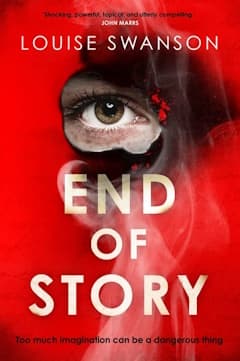
End of Story by Louise Swanson
(Hodder & Stoughton, 2023)
Reviewed by Shellie Horst
Louise Beech has been writing emotionally powerful, award-winning novels for years. End of Story, written under her pen-name Louise Swanson, is her first foray into speculative fiction. Sitting at the thriller end of the genre, End of Story is set in 2035, five years after the government banned fiction.
Our lead character is Fern Dostoy, a big list author. A problem when fiction is taboo. Made up anythings, and creative practices have re-invented themselves for fear of persecution. Even the diary Fern uses to chronicle her days is subject to prosecution. Understandably, it’s an absolutely terrifying idea for anyone in the creative arts. We are subjected to a hopeless society. With the criminalisation of storytelling, Fern’s career crumbled, losing her wonderful home and everything she holds precious. Fern finds herself isolated, bereft of family, and immensely distrusting, leaving her writing life behind as a cleaner.
Described as a dystopian thriller, the novel is written in diary format, and delivered in five parts. Each part is named after the grieving process.
End of Story is not, however, a dystopian world that worked for me. A bookless, game devoid, theatre stripped, movieless, sea shanty removed Earth is a world beyond where I will go. I struggled with suspending my disbelief. Stories will always be told. If not in print, then by word of mouth. Creativity is sneaky. Swanson acknowledges this by developing a black-market for bedtime stories, and Fern’s critical indignation why rules don’t apply to marketing. And so you read on. Fern is drawn into an underground cult providing these stories via a hotline to children now deprived of imagination.
End of Story isn't for the anxious. Written during the height of the pandemic, the bitter taste of COVID and repression of journalism during the lockdown can be felt from the off. It's also worth noting Swanson was dealing with her own grief when writing this. Read with care.
The tense frantic-tinged prose and claustrophobic style is a testament to the to the author’s skill. Despite my misgivings about a fiction less world, End of Story insisted I return. Swanson plays a game with the reader, dusting paragraphs with subtle clues to why and how Fern Dostoy journals her experiences in this way. To truly submerge in it, give your reading time breathing space. It would be a different experience to read it in one sitting. Not one I’m strong enough for. I needed distance.
The little nods towards what is happening with Fern, the mysterious Tea Man, and her diary takes you beyond the expected 1984 and Fahrenheit 451 references. You have to pay attention. Closely.
End of Story is a highly visual and emotive tale. It deals with sensitive subjects of mental health and tosses them out in the open, with strong attachments. This is the author’s signature move. Swanson captures the main character’s personality and mindset very well. The loss of Fern’s self and her future sits heavy on the protagonist’s shoulders, as does Fern’s grief. The unfinished sentences disrupt the flow of the story at first, but it’s a stylistic choice that leans into the tale.
Its pace mirrors that of loss. Some chapters take time, others speed along.
The final section of the book wasn’t something that I felt added to it. To clarify why without spoilers is tricky. This section connects and expands matters for those less familiar with dystopian and science fiction expectations.
Despite these niggles (and Beech’s love of one star reviews), I don't have a problem recommending End of Story, especially to those who are horrified by the idea of a storyless world. End of Story belongs on reading lists, causing endless discussions. While Beech is enjoying recommendations within glossy magazines, it would not surprise me to find End of Story on recommendations within universities, as well. For BSFA members who know the genre, and their tropes? To those, End of Story may frustrate, despite its Atwoodesque feel. Until recently, Margaret Atwood was the first to acknowledge she doesn't write science fiction. To quote Atwood’s short story, Moral Disorder “In the end, we'll all become stories.”
Some books defy genre. End of Story is one of those.
Review from BSFA Review 21 - Download your copy here.
